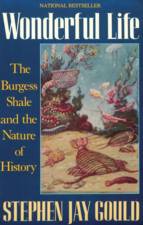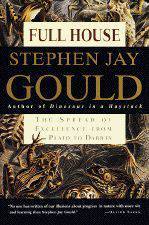

| Click on a book's image or title to order from Amazon.com |

Wonderful Life: The Burgess Shale and the Nature of History
W.W. Norton, TPB, © 1989, 323 pp, ISBN #0-393-30700-X;Reviewed October 2002
Stephen Jay Gould somehow manages to always present ideas in a way I'd never thought of before, and thus interests me in topics that have never before grabbed me. In Wonderful Life, the topic at hand is taxonomy, the classification of animals (not to be confused with taxidermy, the stuffing of dead animals). As a kid, I was into dinosaurs, but mainly because they were big, fierce, and weird. I wasn't much interested in earlier or later creatures (who were either small, tame, or too close to creatures we see today), and certainly had no time for figuring out what groups they fell into.
The story of the Burgess shale is about a bunch of small, strange arthropods - and, more interestingly, non-arthropods - who lived near the dawn of multicellular life. Discovered in the early 20th century, the prevailing paleontological philosophy (say that five times fast!) at the time was that early creatures were ancestors - evolutionarily speaking - of creatures we know in the present day, and so all the Burgess organisms were "shoehorned" (Gould's word) into existing groups.
Wonderful Life is about a group of scientists in the 60s and 70s who more closely examined the thousands of fossils from the Burgess and discovered that this isn't so: Many of the organisms are clearly unique creatures whose lineages died out early in history, never to be seen again. This revolutionized evolutionary thinking, and supported Gould's oft-pushed statement that life didn't evolve in a straight line with the goal of producing humanity, but worked in fits and starts and great mass extinctions and the fact that we're here as sentient beings is luck of the draw. Had the extinction which wiped out most of the Burgess creatures gone just a little differently, life on Earth would be radically different.
Taxonomy: Carefully studying the anatomy of the fossils - which are valuable because more than just their "hard parts" were fossilized - to find that they bear only tangential relationship to creatures we know. Some of them are the equal or superior of their contemporaries which are ancestors of modern life, but that didn't help them when conditions changed.
Beyond presenting the drama of the Burgess as a story in five acts, Gould goes on to work his usual theme of how evolution works into an explanation of the "science of history" as a whole. He puts forth the fact that science doesn't always work by the "scientific method", no matter what our teachers may have claimed, since historical science can't be reproduced in a laboratory. But it can be used to draw inferences and make predictions about later historical finds (the story of the prediction of Archaeopterix by Darwin is lucidly present in Louis Psihoyos' book Hunting Dinosaurs, for instance). It's an effective refutation of the silly claims by creationists that the theory of evolution is "just a theory" because it doesn't adhere to the scientific method and doesn't "prove" anything (though Gould makes his points more kindly than I am here).
Replete with many lovely diagrams and images, Wonderful Life is a wonderful book, evocative and stimulating. Reading about weird little shelly creatures at the dawn of history may not be everyone's cup of tea, but it's certainly worth a look.

Full House: The Spread of Excellence from Plato to Darwin
Harmony Books, HC, © 1996, 230 pp, ISBN #0-517-70394-7In this book, paleontologist and zoologist Gould sets himself two goals: To explain why no one in Major League Baseball has batted over .400 in the last fifty years, and to illustrate why humans can in no way be regarded as the end result or greatest achievement of evolution on Earth. To do this, he employs a method of examining both issues which go beyond the most popular statistics and views of each.
His basic point is this: It's not enough to simply consider the most remarkable end of a set of events or objects to draw a conclusion about the set; you must instead consider the thing in its entirety (the "full house" of the subject) and examine all its facets to determine how it behaves.
In baseball, his point is that baseball players of the 1920s were performing at a lower level of ability as a whole, so the very best of them tended to be so much better than the average player that they could hit .400 in a full season. But today in the 1990s, the average player in the Major Leagues is actually getting close to the maximum potential of human physical ability, so the very best players simply don't have 'room' to be that much better than their 'merely' average peers. The very best player today and the very best player in 1925 may be equally good players, but today's player is facing much better pitching, and finds it much harder to reach that .400 mark.
His evolutionary point is similar, though in a sense reversed: Evolution does not have an innate trend to produce more complex or "higher" life forms; its development is entirely random. However, it appears that there is such a trend only because the initial life forms could not become less complex. There's a 'wall' at the bottom of the hierarchy of life below which complexity cannot fall. However, the variety of the simplest life forms is unmatched; Gould presents a wide variety of evidence for how bacteria are the most numerous, most diverse, and most enduring life on this planet (as well as hazarding a guess that the raw mass of all bacteria on the planet may well outweigh the mass of everything else on Earth). He further makes the point that this illusionary trend in evolution need not have produced man as an "end result" (never mind that we're almost certainly not the end of the matter), but that it could have produced nearly anything.
(As an aside, I'm always amused when I read some yokel in the paper writing about how evolution is a religion because it's no more been proven than the stories in the Bible have been. Reading Gould makes me feel that the theory of evolution is at least as reliable as our faith in what we see with our own eyes.)
Full House is an entertaining and informative book, although Gould perhaps spends a little too much time laying out his evidence for the supremacy of bacteria (eventually one is just forced to think, "ick!"). But certainly from either a baseball or a scientific perspective, it's well worth reading.
hits since 13 August 2000.